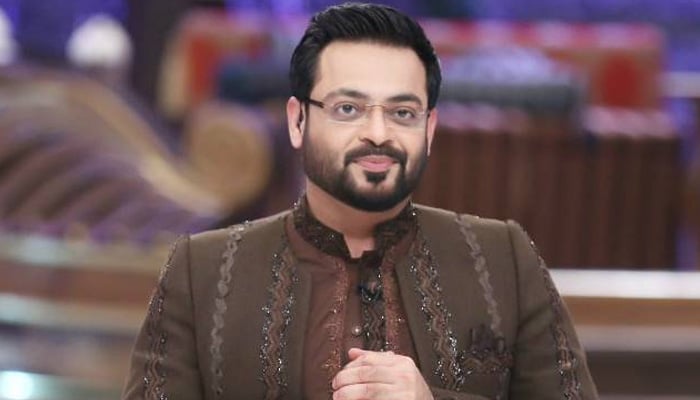SHC suspends order directing Aamir Liaquat’s autopsy
Petition was filed by Aamir Liaquat's son and daughter requesting the court to stop the postmortem
KARACHI: The Sindh High Court (SHC) Wednesday suspended the order of a local court directing the postmortem of Dr Aamir Liaquat Hussain.
The petition was filed by Aamir Liaquat's son and daughter requesting the court to stop the exhumation and postmortem which was to be conducted on June 23.
At the outset of today’s hearing, Advocate Zia Ahmed Awan, the petitioner’s counsel, said that the judicial magistrate (East) had issued an order after hearing his client’s verbal statement. He said that they opposed the postmortem examination of Aamir Liaquat.
At this, the judge ordered the lawyer to read out the order of the judicial magistrate. Subsequently, the SHC suspended the magistrate’s order regarding Aamir Liaquat’s autopsy.
After hearing the ruling, his former wife Bushra Iqbal bursts into tears.
A two-member SHC bench heard the case today.
Judicial Magistrate (East) Wazeer Hussain Memon on June 20 ordered authorities to conduct a post-mortem on the televangelist's body who passed away earlier this month in mysterious circumstances.
A six-member medical board was formed for the autopsy on the court order. Police surgeon Dr Summaiya Syed was appointed its head.
Additional police surgeon Shahid Nizam, Jinnah Postgraduate Medical Centre's Forensics Medicine Head of the Department Pervaiz Makhdoom, medico-legal officer Dr Areeb Baqai, forensic expert Dr Hari Ram and Dr Gulzar Ali were part of the medical board.
The judicial magistrate (East) approved the petition of a citizen seeking the autopsy of the anchorperson.
The petition was filed stating that Hussain's sudden death has raised suspicions among his fans and it is suspected that he was killed over a property dispute.
The petitioner requested the court to form a special board for the exhumation and autopsy of Hussain, saying that identifying the cause of his death was necessary.
In its order, the court had said that Liaquat’s family — the “heirs of his grave” — have maintained that conducting the anchorperson’s post-mortem would violate the sanctity of his grave.
But the court had maintained that if the death is suspicious and there is a fear that a crime might have been committed, then the law will have to take its course.
-
Security forces gun down 30 terrorists in multiple IBOs in KP: ISPR
-
MQM-P calls for new province in Sindh
-
US report validates Pakistan military edge over India: PM
-
Banned TTP poses serious threat to Pakistan security: UNSC panel
-
CM Afridi clarifies remarks on by-poll after ECP requests army deployment
-
Dubai sees 3.2m Pakistani passengers in 2025 as airport sets new milestone
-
Security forces kill 23 Indian proxy terrorists in KP's Kurram
-
Pakistan to construct island to boost oil exploration: report












